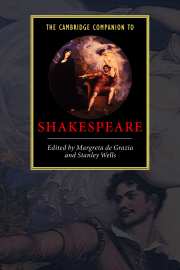Book contents
- Frontmatter
- 1 Shakespeare’s life
- 2 The reproduction of Shakespeare’s texts
- 3 What did Shakespeare read?
- 4 Shakespeare and the craft of language
- 5 Shakespeare’s poems
- 6 The genres of Shakespeare’s plays
- 7 Playhouses, players, and playgoers in Shakespeare’s time
- 8 The London scene
- 9 Gender and sexuality in Shakespeare
- 10 Outsiders in Shakespeare’s England
- 11 Shakespeare and English history
- 12 Shakespeare in the theatre, 1660-1900
- 13 Shakespeare in the twentieth-century theatre
- 14 Shakespeare and the cinema
- 15 Shakespeare on the page and the stage
- 16 Shakespeare worldwide
- 17 Shakespeare criticism, 1600--1900
- 18 Shakespeare criticism in the twentieth century
- 19 Shakespeare reference books
- Index
6 - The genres of Shakespeare’s plays
Published online by Cambridge University Press: 28 May 2006
- Frontmatter
- 1 Shakespeare’s life
- 2 The reproduction of Shakespeare’s texts
- 3 What did Shakespeare read?
- 4 Shakespeare and the craft of language
- 5 Shakespeare’s poems
- 6 The genres of Shakespeare’s plays
- 7 Playhouses, players, and playgoers in Shakespeare’s time
- 8 The London scene
- 9 Gender and sexuality in Shakespeare
- 10 Outsiders in Shakespeare’s England
- 11 Shakespeare and English history
- 12 Shakespeare in the theatre, 1660-1900
- 13 Shakespeare in the twentieth-century theatre
- 14 Shakespeare and the cinema
- 15 Shakespeare on the page and the stage
- 16 Shakespeare worldwide
- 17 Shakespeare criticism, 1600--1900
- 18 Shakespeare criticism in the twentieth century
- 19 Shakespeare reference books
- Index
Summary
Presenting the dramatic works of Shakespeare in the Folio of 1623, John Heminges and Henry Condell categorized them in the table of contents under 'Comedies', 'Histories', and 'Tragedies'. What may strike us now as a conventional grouping was not so at the time: in the most obvious precedent for such a collection, the 1616 Works of Ben Jonson, the plays were arranged chronologically. The organizational principle they chose, which is featured as well in the title of the collection - Mr. William Shakespeares Comedies, Histories,& Tragedies - invites readers of Shakespeare's plays to read in the light of genre, apprehending family resemblances within each group as well as individual distinctions.
For that matter, the individual nature of any work of art is hard to grasp without some sense of the genre to which it belongs - its 'kind', in the language of Shakespeare's day. The genres or kinds can be seen, in Rosalie Colie's words, 'as tiny subcultures with their own habits, habitats, and structures of ideas as well as their own forms'. In recognizing such habits as clowns and wordplay for comedy, and such habitats as royal courts and battlefields for histories and tragedy, we construct a notion of a play's modus operandi that in turn conditions our reactions as dialogue and action unfold. A sense of the norms of genre guides us through that unfolding: prompting sympathy or detachment, highlighting the significance of what we witness, and raising expectations about what is to come. The author may also at times invoke generic codes in order to play against them, refusing to fulfil the expectations he has aroused and thus pointing us in a marked new direction. This contra-use of genre may be overt, as when Shakespeare at the end of Love's Labour's Lost denies, or at least postpones, the traditional comic ending of multiple marriages and has one of the thwarted bridegrooms complain, 'Our wooing doth not end like an old play' (L.L.L. 5.2.851). It may be more subtle and pervasive, as when The Tempest reshapes the makings of revenge tragedy into reconciliation or Romeo and Juliet abruptly derails promises of a comedic conclusion with the deaths of Mercutio and Tybalt and destroys young lovers and all in the subsequent wreck.
- Type
- Chapter
- Information
- The Cambridge Companion to Shakespeare , pp. 83 - 98Publisher: Cambridge University PressPrint publication year: 2001
- 12
- Cited by



